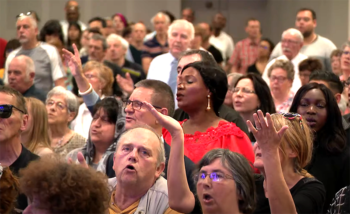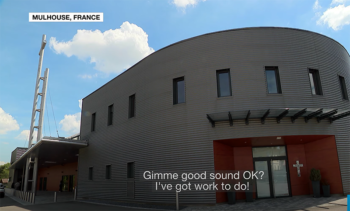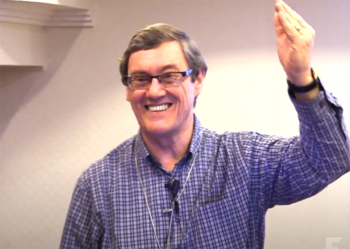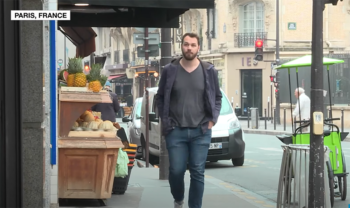
By Michael Ashcraft —
The Gospel has grown by 10,000% in more than a century in France, evangelicalism’s holy grail in Europe.
In the year 1800, there were 2000 Protestant evangelicals, in 2019 there were more than 700,000, according to statistics in a FOCL Online video and news reports.
In 1970, there were 840 evangelical churches, today there are more than 2,440. Every 10 days, a new church opens, said David Brown, chairman of the Evangelism Commission of the French National Council of Evangelicals (CNEF).

“Their numbers are no doubt increasing with the evangelical churches’ emphasis of personal conversion and a direct relationship with God,” says anchor Stuart Norval of France 24 English news in a “Focus” report which characterized the growth as “surprising.”
The news is cheery since evangelical Christianity tails Islam and secular humanism in France. The humanist viewpoint that God is a “construct” used by the rich to suppress the poor was practically born in France. About 8% of the country is Muslim while evangelicals barely make up 1%.
Despite sobering demographics, evangelicals have been growing at about 2.4% a year, in line with most countries in the world, according to the Joshua Project.
François Loury is a recent convert in the Porte Ouverte Chrétienne church in Paris. He recently was baptized and brings his whole family.

“It feels like a church that belongs to the modern world,” François says. “That’s what’s so good about it. That’s what makes it stand out. The pastors wear jeans. They don’t wear suits. They like to have fun; they tell jokes. Sometimes we even find ourselves laughing about religion. I think that in today’s world, that’s important, to have an open mind.”
Porte Ouverte Chrétienne, which means Christian Open Door, stands out compared to the mass offered by the Catholic church. Porte Ouverte’s worship is dynamic and heartfelt, activities are family oriented, and they reach thousands with simultaneous streaming over social media.
“When I attended Catholic mass I felt like a spectator,” says Eric Richter. “Our faith is a bit like for a fan in a soccer stadium. They’re in it together; they have faith in their players. And we have faith in God.”
Daniel Lietchi presides over CNEF’s committee to foment church planting praises God for the growth but prays for much more.

“If we continue like this with a new church established every 10 days, we’ll never accomplish our goal of having one church for every 10,000 French citizens,” Lietchi says. “We want things to progress twice, even three times, as fast. But the outcome depends on God’s will. For example in Spain, a new church opens every three days. Here in France, that’s what we’re aiming for.”
Much of the current church growth stems from a surge of immigrants from Africa and the Caribbean, where people in their native countries have a higher level of openness to the gospel.
Monique Kapinga immigrated from the Democratic Republic of Congo when her husband died. She found a similar worship style and the same earnestness of her native land in the l’Arche de Paix Church, which after 25 years has over 500 members.
“I came to the Arch of Peace because it is a church of truth,” Monique says. “We pray like we pray back home.”
But the spiritual support is not the only help she found at the Parisian church. She also received money and assistance with renewing her immigration status. It’s no wonder immigrants, lonely in a foreign land, congregate together for camaraderie and social networking.
CNEF’s Brown tracks the history of current growth of Christianity in France in the follow epochs:
- From 1935 to 1960, Assemblies of God led the charge with successful church planting
- From 1980 to 1990, the Charismatic movement brought a surge
- From 1990 to 2010, immigration brought a boon.
- Since 1995, native church planters are taking the lead.
Personal evangelism fuels the growth, but white French resist the gospel with a “double insulation.” He says: “They rebuff evangelism by saying they are Catholic or believers in secular philosophy, which is strong in France.
“A person says, ‘Well, I’m not really a believer,’ so you start talking about philosophy and try to convince them,” Brown says. “And then they suddenly say, ‘I’m a Catholic and we can’t believe that.’”
It’s an ironic subterfuge because one believes in the inherent sinfulness of man and the other believes in the inherent goodness of man.
“This means that it is very difficult for a French person to accept the idea that he would be a sinner, because what most people will say is deep down is that people are good,” Brown says. “So you don’t need a Savior.”
Still, born-again Christianity is emerging from the stigma of being strange to the average French person, Brown says, and this makes them a bit more open.
A recent CNEF study suggests the way forward: “What surprised us was that one of the things that people want is information,” Brown says. “They don’t know; they’re ignorant. The second thing was they would talk about it with someone over a coffee or a meal.”
If you want to know more about a personal relationship with God, go here
Michael Ashcraft is also a Christian financial professional selling life insurance and annuities in California.




[…] “A person says, ‘Well, I’m not really a believer,’ so you start talking about philosophy and try to convince them,” Brown says. “And then they suddenly say, ‘I’m a Catholic and we can’t believe that.’” Read the rest: Gospel in France […]
Comments are closed.